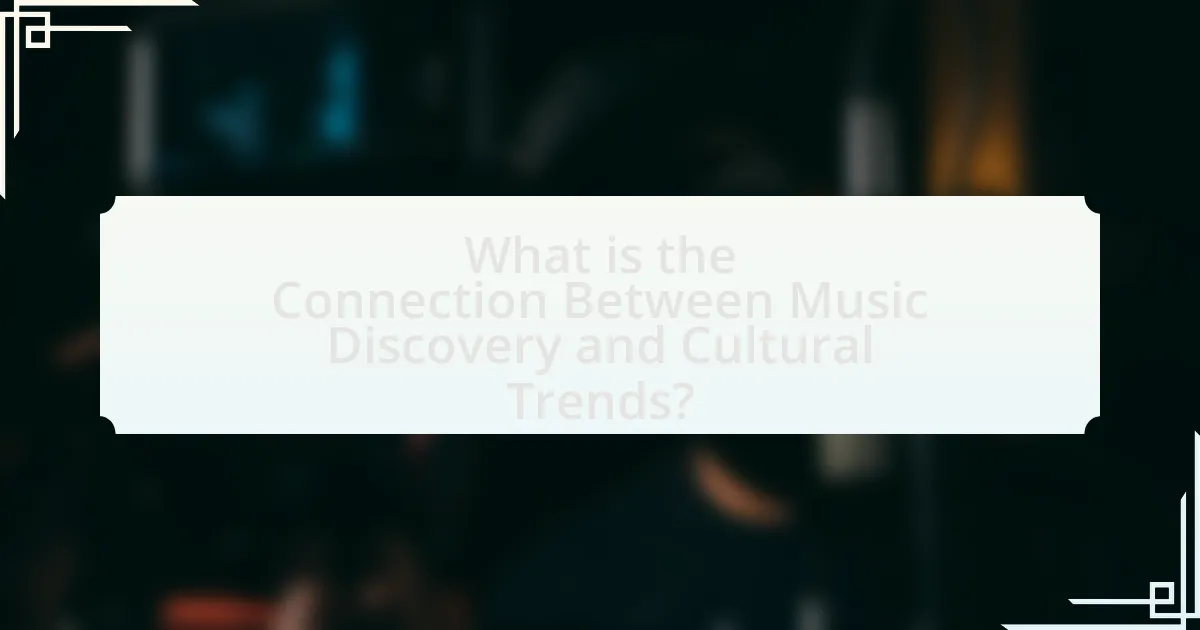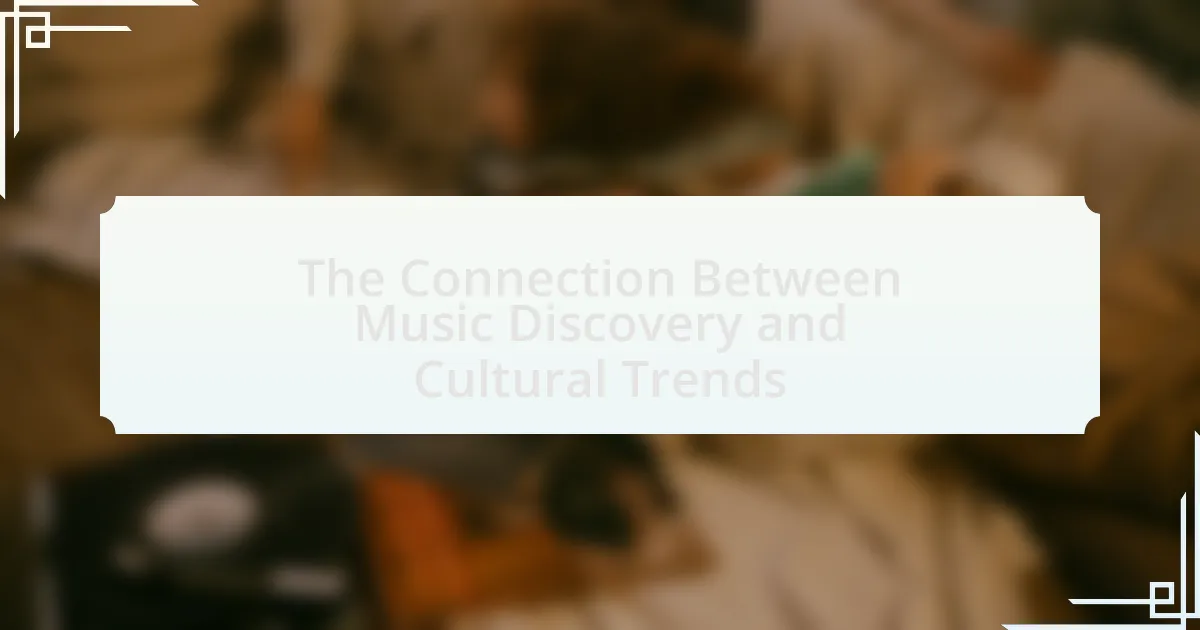The article explores the intricate relationship between music discovery and cultural trends, highlighting how music reflects and influences societal values and movements. It examines the role of digital platforms and social media in shaping listener preferences and promoting new music, emphasizing the impact of cultural trends on music consumption. Key factors driving contemporary music discovery, such as algorithmic recommendations and the influence of viral content, are discussed, alongside the challenges of content oversaturation and algorithmic bias. The article also outlines practical strategies for artists to align their music with current cultural trends, providing insights for marketers on consumer behavior and brand engagement.

What is the Connection Between Music Discovery and Cultural Trends?
The connection between music discovery and cultural trends is that music serves as a reflection and influencer of societal values, behaviors, and movements. As new music emerges, it often encapsulates the sentiments and experiences of a particular time, thereby shaping cultural narratives. For instance, the rise of hip-hop in the 1980s and 1990s not only provided a platform for marginalized voices but also influenced fashion, language, and social activism, demonstrating how music can drive cultural shifts. Additionally, platforms like Spotify and Apple Music facilitate music discovery, allowing listeners to access diverse genres and artists, which in turn fosters cross-cultural exchanges and influences contemporary trends. This interplay highlights how music discovery is not just about finding new sounds but also about engaging with and shaping cultural identities.
How do cultural trends influence music discovery?
Cultural trends significantly influence music discovery by shaping listener preferences and the platforms through which music is accessed. For instance, the rise of social media platforms like TikTok has transformed how new music is promoted and discovered, as viral challenges and trends can propel songs to mainstream popularity almost overnight. According to a report by Nielsen Music, 67% of music listeners discover new music through social media, highlighting the impact of cultural trends on music consumption. Additionally, cultural movements, such as the resurgence of interest in vinyl records, have led to a renewed appreciation for certain genres and artists, further influencing what music is sought after and celebrated in contemporary society.
What role do social media platforms play in shaping music trends?
Social media platforms significantly influence music trends by providing artists with a direct channel to reach audiences and enabling viral sharing of content. Platforms like TikTok and Instagram allow users to discover new music through short clips, challenges, and user-generated content, which can lead to rapid popularity and chart success. For instance, the song “Old Town Road” by Lil Nas X gained immense traction on TikTok before topping the Billboard charts, illustrating how social media can propel a track into mainstream culture. Additionally, algorithms on these platforms curate personalized music recommendations, further shaping listener preferences and trends.
How do cultural movements impact the genres of music that gain popularity?
Cultural movements significantly influence the genres of music that gain popularity by shaping societal values, aesthetics, and collective identities. For instance, the counterculture movement of the 1960s led to the rise of rock music, which reflected the era’s themes of rebellion and social change. Similarly, the hip-hop movement emerged from urban communities, addressing issues like inequality and identity, which resonated with a broad audience and propelled the genre into mainstream culture. Historical data shows that music genres often align with the prevailing cultural narratives; for example, the rise of electronic dance music in the 1990s coincided with the rave culture, emphasizing freedom and community. Thus, cultural movements serve as catalysts for the emergence and popularity of specific music genres, as they encapsulate the sentiments and aspirations of their time.
What are the key factors driving music discovery in contemporary culture?
Key factors driving music discovery in contemporary culture include digital platforms, social media influence, and algorithmic recommendations. Digital platforms like Spotify and Apple Music provide vast libraries and personalized playlists, making it easier for listeners to explore new genres and artists. Social media platforms, such as TikTok and Instagram, amplify music trends through viral challenges and user-generated content, significantly impacting what music becomes popular. Additionally, algorithmic recommendations based on user listening habits enhance the discovery process by suggesting tracks that align with individual preferences, thus facilitating exposure to diverse music styles. These elements collectively shape the contemporary music landscape, influencing listener behavior and cultural trends.
How does technology facilitate music discovery?
Technology facilitates music discovery by providing platforms and algorithms that curate personalized music recommendations. Streaming services like Spotify and Apple Music utilize data analytics and machine learning to analyze user listening habits, enabling them to suggest songs and artists that align with individual preferences. For instance, Spotify’s Discover Weekly playlist uses algorithms that consider user behavior and preferences to introduce listeners to new music, resulting in over 40 million users engaging with the feature monthly. This data-driven approach not only enhances user experience but also promotes emerging artists by increasing their visibility through targeted recommendations.
What impact do music streaming services have on cultural trends?
Music streaming services significantly influence cultural trends by democratizing access to diverse music genres and facilitating global music discovery. These platforms, such as Spotify and Apple Music, allow users to explore a wide array of musical styles from different cultures, leading to the blending of genres and the emergence of new musical trends. For instance, the rise of K-pop in Western markets can be attributed to its accessibility through streaming services, which has contributed to a broader acceptance of non-Western music. Additionally, data from the International Federation of the Phonographic Industry indicates that streaming now accounts for over 60% of global recorded music revenue, highlighting its central role in shaping listening habits and cultural preferences.
Why is understanding the connection between music discovery and cultural trends important?
Understanding the connection between music discovery and cultural trends is important because it reveals how music influences and reflects societal values and behaviors. This relationship helps identify shifts in cultural dynamics, as music often serves as a barometer for social change. For instance, the rise of streaming platforms has transformed how audiences discover music, leading to the emergence of diverse genres that reflect contemporary issues, such as social justice and identity. Research by the Pew Research Center indicates that 72% of Americans listen to music daily, highlighting its pervasive role in shaping cultural experiences. Thus, analyzing this connection provides insights into both the evolution of music and the broader cultural landscape.
How can artists leverage cultural trends for music promotion?
Artists can leverage cultural trends for music promotion by aligning their music and marketing strategies with current societal interests and movements. For instance, artists can create content that resonates with popular themes, such as social justice or environmental awareness, which are prevalent in contemporary discourse. This alignment not only enhances relatability but also increases the likelihood of media coverage and audience engagement.
Research indicates that music that reflects cultural moments tends to perform better on streaming platforms; for example, songs that incorporate viral challenges or trending topics on social media often see a spike in popularity. Additionally, collaborations with influencers who are at the forefront of cultural trends can amplify an artist’s reach, as these influencers can introduce the music to their followers, effectively tapping into existing cultural conversations.
What insights can marketers gain from this connection?
Marketers can gain insights into consumer behavior and preferences by analyzing the connection between music discovery and cultural trends. This relationship reveals how music influences lifestyle choices, social interactions, and brand perceptions. For instance, studies show that 70% of consumers feel more connected to brands that align with their musical tastes, indicating that music can enhance brand loyalty and engagement. Additionally, understanding emerging musical genres and their cultural significance allows marketers to tailor campaigns that resonate with target demographics, ultimately driving sales and brand awareness.
How does the evolution of music discovery reflect broader cultural shifts?
The evolution of music discovery reflects broader cultural shifts by illustrating changes in technology, social behavior, and access to information. As music discovery transitioned from radio and physical media to digital platforms and streaming services, it mirrored the rise of the internet and social media, which democratized access to music. For instance, the introduction of platforms like Spotify and Apple Music allowed users to explore diverse genres and artists globally, reflecting a cultural shift towards individualism and personalization in consumption. Additionally, the use of algorithms and social sharing features on these platforms highlights a cultural trend towards community and collaboration, as listeners increasingly rely on peer recommendations and curated playlists. This shift is evidenced by the fact that in 2020, over 60% of music listeners reported discovering new music through streaming services, showcasing how technology has reshaped cultural engagement with music.
What challenges exist in the relationship between music discovery and cultural trends?
The challenges in the relationship between music discovery and cultural trends include the oversaturation of content and algorithmic bias. Oversaturation occurs as digital platforms provide vast amounts of music, making it difficult for listeners to find new and relevant tracks that resonate with their cultural context. For instance, in 2021, Spotify reported over 70 million tracks available, which can overwhelm users and dilute the impact of emerging cultural trends. Algorithmic bias further complicates this relationship by favoring established artists and genres, limiting exposure for diverse or niche music that may align with evolving cultural movements. This bias can perpetuate existing trends rather than facilitate the discovery of innovative sounds that reflect changing societal values.
What practical strategies can artists use to align their music with cultural trends?
Artists can align their music with cultural trends by actively engaging with social media platforms to understand audience preferences and current conversations. By analyzing trending topics, hashtags, and viral content, artists can tailor their music themes, lyrics, and marketing strategies to resonate with contemporary cultural movements. For instance, a study by Nielsen Music found that 70% of listeners are influenced by social media when discovering new music, highlighting the importance of digital engagement. Additionally, collaborating with influencers or other artists who are already aligned with specific cultural trends can amplify reach and relevance, as seen in the success of artists like Lil Nas X, who effectively utilized social media to connect with cultural narratives.

Leave a Reply